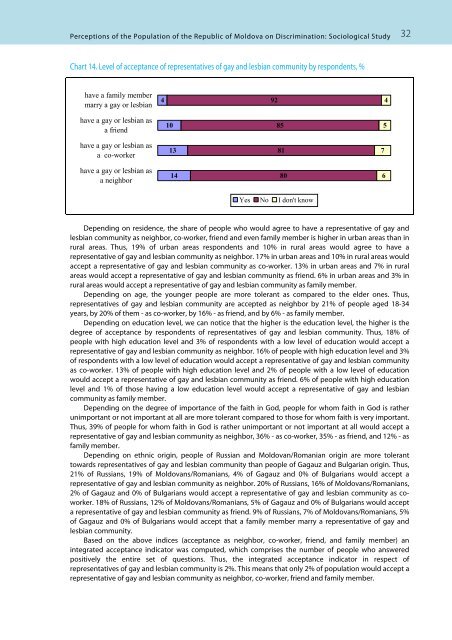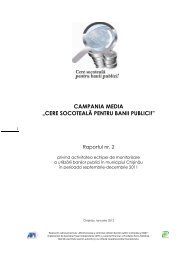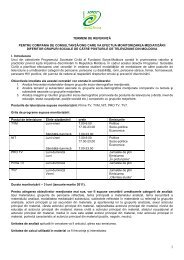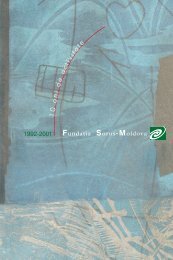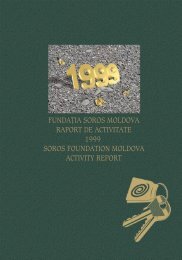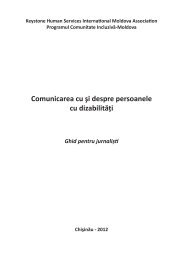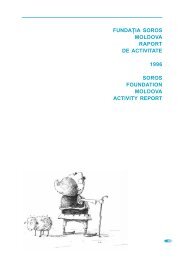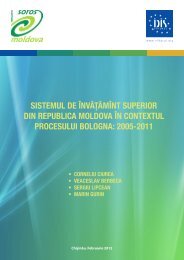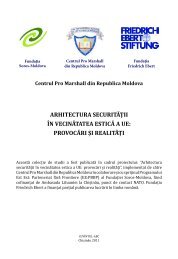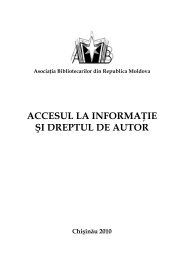Perceptions of the Population of the Republic of Moldova - Soros ...
Perceptions of the Population of the Republic of Moldova - Soros ...
Perceptions of the Population of the Republic of Moldova - Soros ...
- No tags were found...
You also want an ePaper? Increase the reach of your titles
YUMPU automatically turns print PDFs into web optimized ePapers that Google loves.
<strong>Perceptions</strong> <strong>of</strong> <strong>the</strong> <strong>Population</strong> <strong>of</strong> <strong>the</strong> <strong>Republic</strong> <strong>of</strong> <strong>Moldova</strong> on Discrimination: Sociological Study 32Chart 14. Level <strong>of</strong> acceptance <strong>of</strong> representatives <strong>of</strong> gay and lesbian community by respondents, %have a family membermarry a gay or lesbian4924have a gay or lesbian asa friend10855have a gay or lesbian asa co-worker13817have a gay or lesbian asa neighbor14806Yes No I don't knowDepending on residence, <strong>the</strong> share <strong>of</strong> people who would agree to have a representative <strong>of</strong> gay andlesbian community as neighbor, co-worker, friend and even family member is higher in urban areas than inrural areas. Thus, 19% <strong>of</strong> urban areas respondents and 10% in rural areas would agree to have arepresentative <strong>of</strong> gay and lesbian community as neighbor. 17% in urban areas and 10% in rural areas wouldaccept a representative <strong>of</strong> gay and lesbian community as co-worker. 13% in urban areas and 7% in ruralareas would accept a representative <strong>of</strong> gay and lesbian community as friend. 6% in urban areas and 3% inrural areas would accept a representative <strong>of</strong> gay and lesbian community as family member.Depending on age, <strong>the</strong> younger people are more tolerant as compared to <strong>the</strong> elder ones. Thus,representatives <strong>of</strong> gay and lesbian community are accepted as neighbor by 21% <strong>of</strong> people aged 18-34years, by 20% <strong>of</strong> <strong>the</strong>m - as co-worker, by 16% - as friend, and by 6% - as family member.Depending on education level, we can notice that <strong>the</strong> higher is <strong>the</strong> education level, <strong>the</strong> higher is <strong>the</strong>degree <strong>of</strong> acceptance by respondents <strong>of</strong> representatives <strong>of</strong> gay and lesbian community. Thus, 18% <strong>of</strong>people with high education level and 3% <strong>of</strong> respondents with a low level <strong>of</strong> education would accept arepresentative <strong>of</strong> gay and lesbian community as neighbor. 16% <strong>of</strong> people with high education level and 3%<strong>of</strong> respondents with a low level <strong>of</strong> education would accept a representative <strong>of</strong> gay and lesbian communityas co-worker. 13% <strong>of</strong> people with high education level and 2% <strong>of</strong> people with a low level <strong>of</strong> educationwould accept a representative <strong>of</strong> gay and lesbian community as friend. 6% <strong>of</strong> people with high educationlevel and 1% <strong>of</strong> those having a low education level would accept a representative <strong>of</strong> gay and lesbiancommunity as family member.Depending on <strong>the</strong> degree <strong>of</strong> importance <strong>of</strong> <strong>the</strong> faith in God, people for whom faith in God is ra<strong>the</strong>runimportant or not important at all are more tolerant compared to those for whom faith is very important.Thus, 39% <strong>of</strong> people for whom faith in God is ra<strong>the</strong>r unimportant or not important at all would accept arepresentative <strong>of</strong> gay and lesbian community as neighbor, 36% - as co-worker, 35% - as friend, and 12% - asfamily member.Depending on ethnic origin, people <strong>of</strong> Russian and <strong>Moldova</strong>n/Romanian origin are more toleranttowards representatives <strong>of</strong> gay and lesbian community than people <strong>of</strong> Gagauz and Bulgarian origin. Thus,21% <strong>of</strong> Russians, 19% <strong>of</strong> <strong>Moldova</strong>ns/Romanians, 4% <strong>of</strong> Gagauz and 0% <strong>of</strong> Bulgarians would accept arepresentative <strong>of</strong> gay and lesbian community as neighbor. 20% <strong>of</strong> Russians, 16% <strong>of</strong> <strong>Moldova</strong>ns/Romanians,2% <strong>of</strong> Gagauz and 0% <strong>of</strong> Bulgarians would accept a representative <strong>of</strong> gay and lesbian community as coworker.18% <strong>of</strong> Russians, 12% <strong>of</strong> <strong>Moldova</strong>ns/Romanians, 5% <strong>of</strong> Gagauz and 0% <strong>of</strong> Bulgarians would accepta representative <strong>of</strong> gay and lesbian community as friend. 9% <strong>of</strong> Russians, 7% <strong>of</strong> <strong>Moldova</strong>ns/Romanians, 5%<strong>of</strong> Gagauz and 0% <strong>of</strong> Bulgarians would accept that a family member marry a representative <strong>of</strong> gay andlesbian community.Based on <strong>the</strong> above indices (acceptance as neighbor, co-worker, friend, and family member) anintegrated acceptance indicator was computed, which comprises <strong>the</strong> number <strong>of</strong> people who answeredpositively <strong>the</strong> entire set <strong>of</strong> questions. Thus, <strong>the</strong> integrated acceptance indicator in respect <strong>of</strong>representatives <strong>of</strong> gay and lesbian community is 2%. This means that only 2% <strong>of</strong> population would accept arepresentative <strong>of</strong> gay and lesbian community as neighbor, co-worker, friend and family member.


